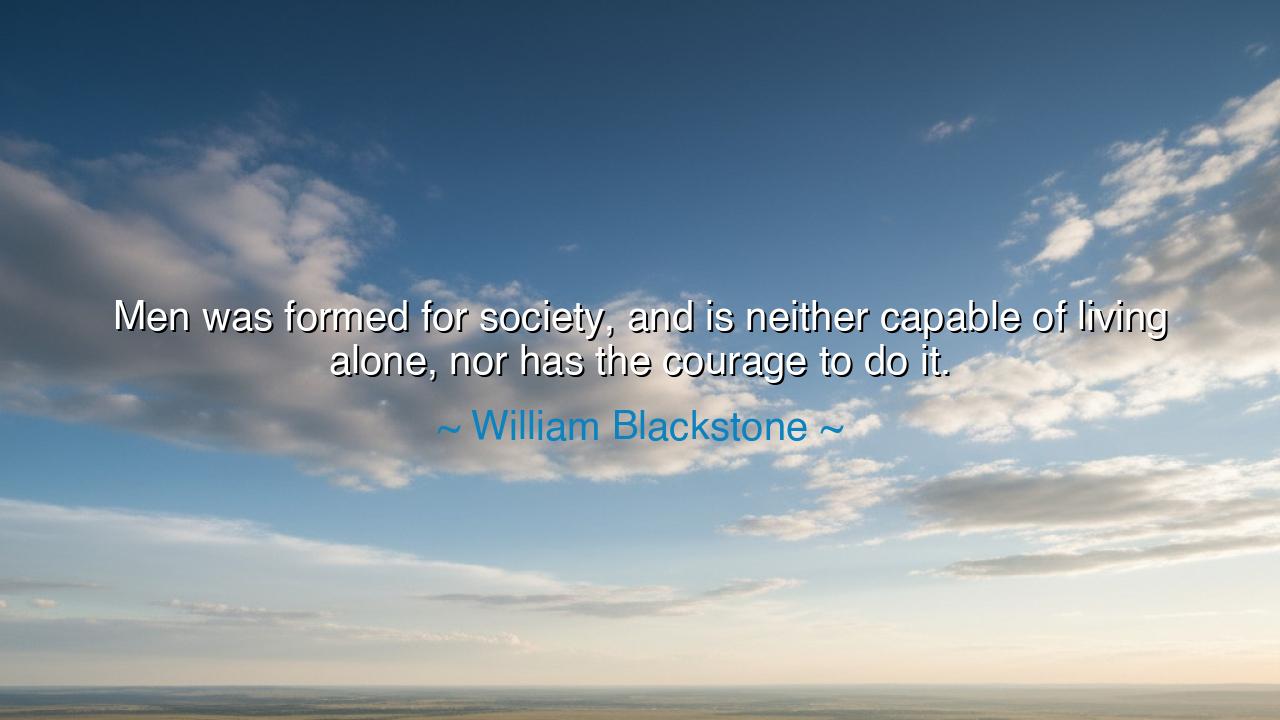
Men was formed for society, and is neither capable of living
Men was formed for society, and is neither capable of living alone, nor has the courage to do it.






“Men was formed for society, and is neither capable of living alone, nor has the courage to do it.” – William Blackstone
In this profound declaration, William Blackstone, the great jurist and philosopher of law, unveils an eternal truth about the nature of humankind — that man was formed for society. These words, though spoken centuries ago, echo the wisdom of the ancients: that no human being is complete in isolation. We are creatures not only of flesh and thought but of connection. To live apart from others is to deny a part of our very design, for we are woven from the same thread that binds one soul to another. And though many speak of independence as strength, Blackstone reminds us that solitude — the complete separation from our fellow beings — is not courage, but despair disguised as pride.
When he says that man “is neither capable of living alone, nor has the courage to do it,” Blackstone exposes the twin truths of human frailty and longing. We depend on one another — for survival, for understanding, for the warmth of belonging. To live entirely alone, to cut oneself off from the voices, the faces, the shared labors of others, is not only unnatural but unbearable. Even the hermit who withdraws from the world does so in the shadow of humanity, carrying within him its language, its memory, its need for meaning. The heart cannot thrive in silence; it seeks reflection, companionship, the echo of its own existence in the eyes of another.
The origin of this wisdom lies deep in human history, in the very first gatherings around the fire. From the dawn of civilization, man has built families, tribes, and nations — not merely for safety, but for purpose. The ancient Greeks called man a “zoon politikon,” a social being by nature, destined to live in community. The philosopher Aristotle taught that one who lives alone must be either a beast or a god — for to be fully human is to dwell among others. Blackstone, standing upon this long lineage of thought, reminds us that our laws, our morals, and our happiness are born from the bond between souls. Without society, virtue would wither, for it is only in relation to others that kindness, justice, and love can exist.
Consider the fate of Alexander Selkirk, the sailor whose story inspired Robinson Crusoe. Cast upon a deserted island, surrounded by nothing but sea and silence, he found that the freedom he once craved became his torment. At first, he rejoiced in his independence — no master, no duty, no law but his own. But soon, loneliness gnawed at his spirit. The sound of his own voice became strange to him, and the days lost meaning without another soul to share them. When he was finally rescued, he wept not from fear but from the joy of seeing another human face. His story, though of adventure, is in truth a testament to Blackstone’s wisdom: man can survive alone, but he cannot live alone.
Even the strongest among us, those who claim self-sufficiency, find their strength nourished by others. The warrior needs comrades; the poet needs listeners; the mother needs her child. Each life becomes a mirror in which another finds itself. Without the society of others, ambition loses its aim, and love loses its object. Solitude, when absolute, becomes a cage — the mind turns inward and devours itself. Only through connection does man discover the full expanse of his humanity.
Yet, there is another layer to Blackstone’s wisdom — the notion that man “has not the courage to live alone.” This is not an insult but a recognition of truth: the soul craves belonging because belonging gives meaning. It takes courage to face oneself in silence, to bear the weight of total self-reliance, to stand in the void without another’s voice to steady one’s heart. Most men shrink from this abyss, for within solitude there is no mask, no distraction, only the unfiltered truth of one’s being. Thus, the longing for society is both a refuge and a necessity — it shields us from the terror of absolute isolation.
So, my children, learn from this truth: man was formed for society. Do not glorify loneliness, nor mistake isolation for strength. Seek the fellowship of others, not as weakness, but as the fulfillment of your nature. Build communities that uplift, friendships that endure, and families bound by love, not convenience. Cherish the hands that reach for yours, and offer your own in return. For in unity there is resilience, and in connection, peace.
And remember, the measure of your strength is not how long you can stand alone, but how deeply you can stand together. The tree that grows in a forest shares its roots with others — drawing life from the same soil, sheltering and being sheltered in return. So too is it with humanity. We are many branches of one great tree, and our destiny is not to live apart, but to rise together — nourished by compassion, bound by courage, and crowned with the joy of belonging.






AAdministratorAdministrator
Welcome, honored guests. Please leave a comment, we will respond soon